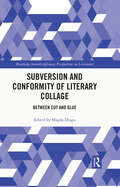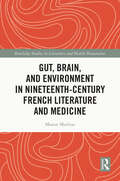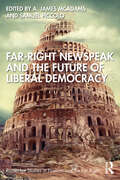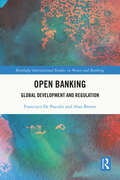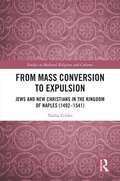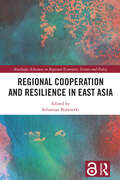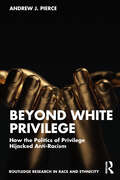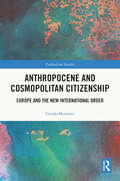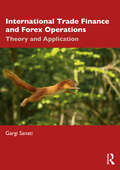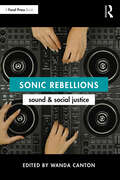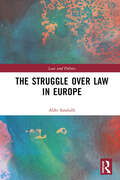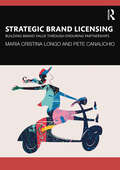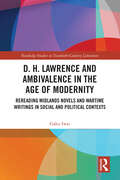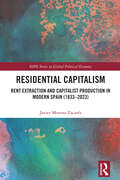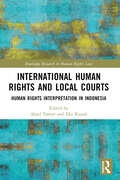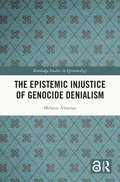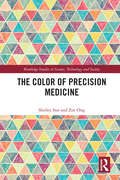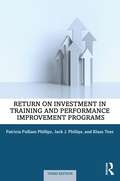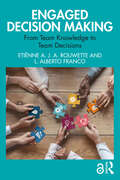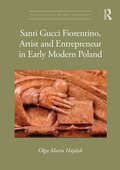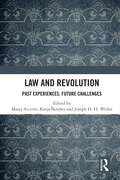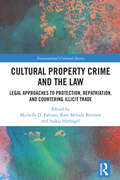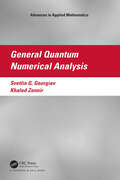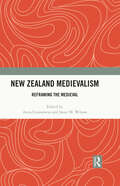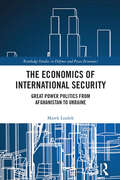- Table View
- List View
Subversion and Conformity of Literary Collage: Between Cut and Glue (Routledge Interdisciplinary Perspectives on Literature)
by Magda DraguSubversion and Conformity of Literary Collage: Between Cut and Glue fills a gap in the current scholarship on literary collage, by addressing how different the interpretations of the concept are, depending on the author who uses the concept and the material and writers surveyed. The book studies writers who employed literary collage during the twentieth and twenty-first centuries, some whose works have been intensely analyzed from this perspective (William S. Burroughs and Walter Benjamin), but also some whose collage-writing style has recently been investigated by writers, being usually placed under the umbrella term of artist books (Stelio Maria Martini).
Gut, Brain, and Environment in Nineteenth-Century French Literature and Medicine (Routledge Studies in Literature and Health Humanities)
by Manon MathiasGut, Brain, and Environment in Nineteenth-Century French Literature and Medicine offers a new way of conceptualizing food in literature: not as social or cultural symbol but as an agent within a network of relationships between body and mind and between humans and environment. By analysing gastrointestinal health in medical, literary, and philosophical texts, this volume rethinks the intersections between literature and health in the nineteenth century and triggers new debates about France’s relationship with food. Of relevance to scholars of literature and to historians and sociologists of science, food, and medicine, it will provide ideal reading for students of French Literature and Culture, History, Cultural Studies, and History of Science and Medicine, Literature and Science, Food Studies, and the Medical Humanities. Readers will be introduced to new ways of approaching digestion in this period and will gain appreciation of the powerful resources offered by nineteenth-century French writing in understanding the nature of connections between gut, mind, and environment and the impact of these connections on our status as human beings.
Far-Right Newspeak and the Future of Liberal Democracy (Routledge Studies in Fascism and the Far Right)
by A. James McAdams Samuel PiccoloThis book is the first systematic, multicountry exploration of far-right Newspeak.The contributors analyze the ways in which contemporary far-right politicians, intellectuals, and pundits use and abuse traditional liberal concepts and ideas to justify positions that threaten democratic institutions and liberal principles. They explore cases of both far-right and right-wing thought in eastern and western Europe, the United States, and Canada. Subjects include well-known figures, such as Marine Le Pen, Tucker Carlson, Peter Thiel, Nick Griffin, Thierry Baudet, Jordan Peterson, Russell Brand, and Viktor Orbán, and lesser-known names, such as the Czech politician Tomio Okamura and the Internet personality "Raw Egg Nationalist." The contributors examine these figures’ claims about hot-button issues, including immigration, Islam, race, Covid-19 policies, feminism, monetary policy, and free speech. The book demonstrates that mainstream politicians and intellectuals are at risk of losing control over the definitions of the very concepts, including equal rights, racial and ethnic diversity, and political tolerance, that undergird their vision of liberal democracy.It will be of interest to scholars, journalists, policymakers, political scientists, historians, political theorists, sociologists, and general audiences concerned about the sophisticated efforts of far-right and right-wing politicians and pundits to undermine the foundations of liberal democracy.
Open Banking: Global Development and Regulation (Routledge International Studies in Money and Banking)
by Francesco De Pascalis Alan BrenerOpen banking ends the proprietary control of customer information by banks and allows customers to share their banking financial data with third parties as a matter of right. It can also permit customers to allow others to remove funds directly from their bank accounts in return for goods and services. All of this is done securely with standardised ‘application programming interfaces’ (APIs). Open banking has developed in different ways and with different objectives across the globe. Open Banking: Global Development and Regulation examines the empowering and enabling regulations that facilitate all of this.This book compares a number of different open banking national strategies. These range from the focus of the UK and EU on enhanced competition to the more collaborative approaches in many East Asian jurisdictions. It also looks at the use of open banking for socio-economic purpose in Brazil and India. Here open banking forms part of a wider government programme to increase financial inclusion coupled with encouraging economic growth.This text will be valuable for fintech companies, policymakers and financial services regulators Its overarching aim is to demonstrate the possibilities and challenges of open banking and how it is changing lives across the world.
From Mass Conversion to Expulsion: Jews and New Christians in the Kingdom of Naples (1492–1541) (Studies in Medieval Religions and Cultures)
by Nadia ZeldesThis book explores the events that marked the last decades of Jewish presence in the kingdom of Naples from 1492 to 1541. It employs a comparative approach in the examination of the mass conversion of the Jews in the Kingdom of Naples in 1495, the failed attempt to establish a Spanish‑style inquisition, and the expulsions of 1510 and 1541. By relying on a variety of sources, including Hebrew literary works and rabbinic Responsa, this study sheds new light on the reception of the refugees of 1492, the evolvement of the political and military crisis of 1495, the attacks on the Jewish communities, and Jewish reaction, all aspects that have never before been subject to systematic analysis. The Spanish victory of 1503 and the transformation of southern Italy into a Spanish‑ruled dominion bring this discussion closer to the Iberian model of mass conversions and expulsions. The unprecedented expulsion of the New Christians along with the Jews offers a unique opportunity for drawing a parallel with the much later expulsion of the Moriscos from Spain.By highlighting these aspects, this book offers insights for understanding the larger issues of the integration of refugees and rejection of minority groups, questions that are as relevant to present concerns and politics as they were on the eve of the modern era.
Regional Cooperation and Resilience in East Asia (Routledge Advances in Regional Economics, Science and Policy)
by Sebastian BobowskiThis book argues that a resilient region should act reactively and proactively in the face of shocks and disruptions and asserts that the institutionalization of regional cooperation may be the answer to development challenges in times of uncertainty and instability.It considers regional, transregional, and subregional cooperation initiatives for building regional resilience and critically examines a broad spectrum of issues, such as international security and trade, economic development, value chains in production, and social welfare. Adopting the concept of resilience allows for a holistic, dynamic, and systematic approach to the studies on the regional process of institutionalization, responsiveness, and adaptability to challenging circumstances. The economic and social indicators of the countries in the region are examined alongside an analysis of the regional institutional architecture.The reader is acquainted with the essence of resilience concerning each category of challenges and the mechanisms of its achievement and strengthening through regional integration. The interdisciplinary character of the book makes it suitable for usage not only by economists but also by lawyers. As such, the book will be helpful to scholars and students of international economics, international security, and policymakers.
Beyond White Privilege: How the Politics of Privilege Hijacked Anti-Racism (Routledge Research in Race and Ethnicity)
by Andrew J. PierceIn the world of academic anti-racism, the idea of white privilege has become the dominant paradigm for understanding racial inequality. Its roots can be traced to radical critiques of racial capitalism, however its contemporary employment tends to be class-blind, ignoring the rifts that separate educated, socially mobile elites from struggling working-class communities.How did this come to be? Beyond White Privilege traces the path by which an idea with radical potential got ‘hijacked’ by a liberal anti-racism that sees individual prejudice as racism’s primary manifestation, and white moral transformation as its appropriate remedy. This ‘politics of privilege’ proves woefully inadequate to the enduring forms of racial and economic injustice shaping the world today. For educated white elites, privilege recognition has become a ritual of purification distinguishing them from their working-class counterparts. For the white working class, whose privileges have eroded, but not disappeared, the politics of privilege often looks like class scapegoating – a process that has helped to drive increasing numbers of alienated whites into the arms of white nationalist movements.This book offers an alternative path: an ‘interest convergence’ approach that recaptures the radical potential of white privilege discourse by emphasizing converging, cross-racial interests – in education, housing, climate justice, and others – that reveal that the ‘racial bribe’ of whiteness is ultimately contrary to the interests of working-class whites. It will therefore appeal to readers across the social sciences and humanities with interests in issues of racial inequality and social justice.
Anthropocene and Cosmopolitan Citizenship: Europe and the New International Order (Federalism Studies)
by Guido MontaniAnthropocene and Cosmopolitan Citizenship criticizes the Westphalia system of international relations and, as an alternative, proposes cosmopolitan citizenship. The book offers a critique of the theory of international relations based on the Westphalian system and the principle of national sovereignty.At the end of the Second World War, the two superpowers agreed on a new international order that, to this day, has prevented a new world war. This era is over. The collapse of the Soviet Union and the economic and political affirmation of new international powers – such as China, India and Brazil – have generated a multipolar world, in which growing tensions between great and small powers are manifested, up to the threat of nuclear war. To this threat, a second one has been added: the possible collapse of the biosphere, an epoch called the Anthropocene, because the pollution of nature is suffocating the life of every living species on the Planet, including Homo sapiens. The United Nations can be viewed as the first step towards a post-Westphalian system, and the European Union represents an alternative model for peaceful relationships among national peoples. The book’s methodology draws on an interdisciplinary relationship between social sciences and nature sciences to provide a European foreign policy strategy that shows how the European Union can play a crucial role in current international politics, helping build a just world in harmony with nature, including by calling for a Global Green Deal and an Earth Constitution. The integration of the national peoples of the European Union shows that supranational citizenship is possible and that national independence is compatible with peaceful international interdependence. The author explores how this can be achieved and how alternatives have failed, with reference to federalism, ecologism, liberalism, democracy, socialism, nationalism, security and patriotism.This book will be of interest to scholars of international relations and European studies and activists, including ecologists, young people, federalists and members of political parties.
International Trade Finance and Forex Operations: Theory and Application
by Gargi SanatiThis book bridges the existing gap between the theory and practices related to international finance. It discusses banking theories and operational procedures relating to the methods of payment with special reference to Letters of credit (LCs), like revolving LCs, back-to-back LCs, transferable LCs, and standby LCs, with specific applications of documentary discrepancies. Moreover, this book discusses merchanting trade, buyers’ credit and supplier’s credit, and bank guarantees with many practical caselets, linked to the applications of the International Chamber of Commerce (ICC) and other regulatory rules. It also examines the various roles of banks in financing international trade which are extensively discussed through several cases.This volume: Explains in-depth the intricacies and discrepancies relating to the documentation involved in international trade Presents in detail the various steps of executing an export or import deal, right from signing of the contract, managing pre-shipment credit, and booking a forward contract to hedge the exchange rate risk till the closing of the deal Gives a comprehensive account of all trade finance products with processes and procedures, rules, and regulations, and risks and mitigates Discusses the application of ICC rules through detailed case-lets, which helps an exporter take necessary actions when the payment is denied by a party overseas, or how an importer can simply deny the payment if there is documentary noncompliance Scrutinises different types of forex transactions, the regulatory framework within which they take place, and the associated risks and solutions Attempts to resolve the existing disparity in the understanding and interpretation of regulatory guidelines and the practices adopted by banks and corporate houses in implementing them. Accessibly written, this book will be useful to students, researchers, and teachers from the fields of management, business studies, international trade and treasury operations, finance, international banking, trade and commerce, and economics. This will also be an invaluable companion to the professionals working in export–import businesses, foreign exchange businesses, treasury front-office and back-office operations, bureaucrats, and public policymakers.
Sonic Rebellions: Sound and Social Justice
by Wanda CantonSonic Rebellions combines theory and practice to consider contemporary uses of sound in the context of politics, philosophy, and protest, by exploring the relationship between sound and social justice, with particular attention to sonic methodologies not necessarily conceptualised or practiced in traditional understandings of activism.An edited collection written by artists, academics, and activists, many of the authors have multidimensional experiences as practitioners themselves, and readers will benefit from never-before published doctoral and community projects, and innovative, audio-based interpretations of social issues today. Chapters cover the use of soundscapes, rap, theatre, social media, protest, and song, in application to contemporary socio-political issues, such as gentrification, neoliberalism, criminalisation, democracy, and migrant rights. Sonic Rebellions looks to encourage readers to become, or consider how they are, Sonic Rebels themselves, by developing their own practices and reflections in tandem to continue the conversation as to how sound permeates our sociopolitical lives.This is an essential resource for those interested in how sound can change the world, including undergraduates and postgraduates from across the social sciences and humanities, scholars and instructors of sound studies and sound production, as well as activists, artists, and community organisers.
The Struggle over Law in Europe (ISSN)
by Aldo SandulliThis book examines the role of law in Europe at a time when economic policies have become dominant not only on this continent but globally. Can law be seen as a mere infrastructure? Or does it contribute to defining the social and legal order through its own inherent rules? If the second hypothesis is true, what might these rules be, and how may they be identified? Lastly, to what extent can agreeing a definition of the role of law affect the future of Europe? With the Next Generation European Union, the EU has introduced an unprecedented investment plan for economic recovery and resilience. In doing so, it has become the most important financial intermediary on the continent. But is this simply the prelude to a European economic and financial revival, or does it also aim to strengthen the European legal order in social, political, and constitutional terms? This book argues that the role of law in Europe should be to achieve a balanced relationship between freedom and solidarity; encouraging economic competition, but also social cohesion. Analyzing the role of law in the project of European integration, it maintains that law should be more than an infrastructure for finance and economics, showing how it can act as a guide and a binding force to achieve a more balanced relationship between economics, politics, and law. This book will be of interest to scholars in the fields of public law, European law, law and economics, the philosophy of law, legal history, political theory, and political science, as well as others concerned with the future of European integration.
Strategic Brand Licensing: Building Brand Value through Enduring Partnerships
by Maria Cristina Longo Pete CanalichioThis book presents a roadmap for a brand licensing strategy to enable companies to leverage brand value and expand into other product categories or into different markets. Readers will understand both the risks and the benefits of partnerships, how to make the most of a brand's potential in the digital platform, and how to extend a product portfolio through established brands. Brand licensing can be of interest to many stakeholders, including large companies, entrepreneurs, retailers, agencies and even celebrities. This is also a relevant strategy for small and medium-sized enterprises that want to expand their business abroad, reconciling their limited size with their flexibility. Examples of long-standing partnerships are presented and analyzed, with detailed consideration of what has made them so successful.Through the presentation of case studies in the sectors particularly interested in brand licensing, including the art, character, entertainment, fashion, jewelry, sports and toys sectors, this book aims to highlight opportunities, limits and challenges from both the licensor and licensee’s perspectives. In particular, these case studies represent an effective basis for comparing different experiences and brand licensing strategies, allowing readers to understand both best practices and pitfalls to avoid when building an effective and enduring licensing program. Chapter objectives, summaries, key learning points and discussion questions reinforce understanding and aid reflection.Practical yet theoretically grounded, this book is particularly suitable for postgraduate, MBA and executive education students interested in strategic brand management, licensing strategy and brand expansion. This book can also serve as a valuable guide for professionals interested in expanding their brand portfolio.This book provides effective tools to evaluate the strategic side of brand licensing and the selection of the appropriate company to be a licensee. Online resources include PowerPoint slides, a test bank of exam questions, a case list and discussion questions.
D. H. Lawrence and Ambivalence in the Age of Modernity: Rereading Midlands Novels and Wartime Writings in Social and Political Contexts (Routledge Studies in Twentieth-Century Literature)
by Gaku IwaiD. H. Lawrence is renowned for his scathing criticism of the ruling class, industrialisation of the country and wartime patriotism. However, his texts bear the imprint of contemporary dominant ideologies and discourses of the period. Comparing Lawrence’s texts to various major and minor contemporary novels, journal articles, political pamphlets and history books, this book aims to demonstrate that Lawrence’s texts are ambivalent: his texts harbour the dynamism of conflicting power struggles between the subversive and the reactionary. For example, in some apparently apolitical texts such as The White Peacock and Movements in European History, reactionary ideologies and wartime propaganda are embedded. Some texts like Lady Chatterley’s Lover are intended to be a radical critique of the period wherein it was composed, but they also bear discernible traces of the contemporary frame of reference that they intend to subvert. Focusing on Lawrence’s stories and novels set in the mining countryside and the works composed under the impact of the First World War, this book establishes that Lawrence’s texts in fact consist of multiple layers that are often in conflict with each other, serving as a testimony to the age of modernity.
Residential Capitalism: Rent Extraction and Capitalist Production in Modern Spain (1833–2023) (ISSN)
by Javier Moreno ZacarésOver the last decade, Spain has become an emblem of the contradictory relationship between capitalism and housing. During the house-price boom of the 2000s, Spain built homes on an unprecedented scale, with output levels that overshadowed those of every major European economy. Nevertheless, when the fortunes of real estate markets turned, a wave of repossessions ensued, and a massive number of households were thrown out into the street as a sizeable portion of the housing stock was lying vacant. In turn, the implosion of Spanish residential capitalism triggered an intense wave of unrest that has come to shape a decade of political turmoil.This book uses the Spanish case to bring to light, and theorise, the workings of residential capitalism. The author traces the evolution of residential provision from the nineteenth century to the present, situating the transformation of the housing market in a context of ongoing social change and conflict. The book shows how the present needs to be understood by looking at the historical process through which residential provision became subsumed under the logic of capitalist accumulation but also at a long genealogy of struggles around urbanisation and housing, the outcomes of which remain crystallised in Spain’s urban institutions. The author reveals how both residential capitalist development and urban social conflict have constituted each another, casting light on the historical relationship between housing crises, urban unrest, and the evolution of real estate markets. The book develops a historicist framework to understand residential capitalism, an important contribution for an age in which real estate markets have come to determine the rhythms of global capital.Addressing key issues and debates in the field, including the financialisation of housing, the politics of scale and urban entrepreneurialism, the political economy of the Eurozone, and the history of capitalist development, this book will be of great interest to students and scholars of political economy, as well as those engaged in crossover fields such as housing studies, urban geography, or financial geography.
International Human Rights and Local Courts: Human Rights Interpretation in Indonesia (Routledge Research in Human Rights Law)
by Aksel Tømte Eko RiyadiThis book addresses the technicalities of how international human rights law can be applied at the domestic level through a case study of the human rights methodology of the Indonesian judiciary. Numerous international human rights treaties have been ratified by States parties all around the world. However, local implementation has proven a difficult task for national authorities with every State struggling to realize rights to varying degrees. This reveals a gap between the standards of human rights as envisaged by the law and those experienced by rights holders at the local level. This work analyses how Indonesian courts interpret and apply human rights. It discusses the position of human rights within specific areas of Indonesian law: constitutional law, criminal law and private law. It analyses how courts have dealt with specific cases within these fields of law. Its key contribution lies in its detailed attention to the role of the Indonesian judiciary in implementing human rights, as well as to the influence of international law, and the role that actors other than the judiciary play in this process. It also incorporates international comparative perspectives. The book will be of particular interest to human rights scholars concerned with national judiciaries’ role in human rights implementation, and to scholars, judges, civil society actors and legal practitioners working with law and human rights in Indonesia.
The Epistemic Injustice of Genocide Denialism (Routledge Studies in Epistemology)
by Melanie AltanianThe injustice of genocide denial is commonly understood as a violation of the dignity of victims, survivors, and their descendants, and further described as an assault on truth and memory. This book rethinks the normative relationship between dignity, truth, and memory in relation to genocide denial by adopting the framework of epistemic injustice.This framework performs two functions. First, it introduces constructive normative vocabulary into genocide scholarship through which we can gain a better understanding of the normative impacts of genocide denial when it is institutionalized and systematic. Second, it develops and enriches current scholarship on epistemic injustice with a further, underexplored case study. Genocide denialism is relevant for political and social epistemology, as it presents a substantive epistemic practice that distorts normativity and social reality in ways that maintain domination. This generates pervasive ignorance that makes denial rather than recognition of genocide appear as the morally and epistemically right thing to do. By focusing on the prominent case of Turkey’s denialism of the Armenian genocide, the book shows the serious consequences of this kind of epistemic injustice for the victim group and society as a whole.The Epistemic Injustice of Genocide Denialism will appeal to students and scholars working in social, political, and applied epistemology, social and political philosophy, genocide studies, Armenian studies, and memory studies.The Open Access version of this book, available at www.taylorfrancis.com, has been made available under a Creative Commons Attribution-Non Commercial-No Derivatives (CC-BY-NC-ND) 4.0 license. Any third party material in this book is not included in the OA Creative Commons license, unless indicated otherwise in a credit line to the material. Please direct any permissions enquiries to the original rightsholder.Funded by: Swiss National Science Foundation
The Color of Precision Medicine (Routledge Studies in Science, Technology and Society)
by Shirley Sun Zoe OngWill genome-based precision medicine fix the problem of race/ethnicity-based medicine? To answer this question, Sun and Ong propose the concept of racialization of precision medicine, defined as the social processes by which racial/ethnic categories are incorporated (or not) into the development, interpretation, and implementation of precision medicine research and practice.Drawing on interview data with physicians and scientists in the field of cancer care, this book addresses the following questions: Who are the racializers in precision medicine, how and why do they do it? Under what conditions do clinicians personalize medical treatments in the context of cancer therapies? The chapters elucidate different ways in which racialization occurs and reveal that there exists an inherent contradiction in the usage of race/ethnicity as precision medicine moves from bench to bedside. The relative resources theory is proposed to explain that whether race/ethnicity-based medicine will be replaced by genomic medicine depends on the resources available at the individual and systemic levels. Furthermore, this book expands on how racialization happens not only in pharmacogenomic drug efficacy studies, but also in drug toxicity studies and cost-effectiveness studies.An important resource for clinicians, researchers, public health policymakers, health economists, and journalists on how to deracialize precision medicine.
Return on Investment in Training and Performance Improvement Programs
by Patricia Pulliam Phillips Jack J. Phillips Klaas ToesThe third edition of this bestselling book guides you through a proven, results-based approach to calculating the return on investment in training and performance improvement programs. The ROI Methodology described in the book has evolved into the most used evaluation system in the world.Patricia Pulliam Phillips, Jack J. Phillips, and Klaas Toes present the ROI Methodology, a user-friendly approach to showing and proving the value of programs, projects, and initiatives. Based on over 40 years of development and refinement, it is a process that meets the demands currently facing training and performance improvement functions. This third edition includes chapters thoroughly detailing the application of the ROI Methodology and new and innovative developments. The book provides examples, case studies and worksheets, and solutions to implementation issues. A case study spans the book and takes the reader through each part of the ROI Methodology. Readers can work through the case, step-by-step, exploring the issues uncovered in the chapter and learn how to apply the process in their own organizations. This book continues to be a primary reference for learning how to utilize ROI to show the contribution of training, education, learning systems, performance improvement, human resources, and change initiatives throughout organizations.Proven to work as a guide for practitioners, managers, and leaders, the book is also ideal for students of learning and development and performance improvement at graduate and postgraduate levels and individuals involved in executive and professional development programs. A complimentary 500-page book with 25 detailed case studies is available to book purchasers. See the offer on page 384 at the back of the book.
Engaged Decision Making: From Team Knowledge to Team Decisions
by Etiënne A. Rouwette L. Alberto FrancoIn the knowledge economy, teams play a central role in decisions made within and across organisations. The reason why teams with diverse compositions are often used is arguably their ability to develop solutions that none of their members could have produced alone. Systems design, strategy and policy development, risk management, and innovation are just a few of the areas that call for team decisions. Unfortunately, a considerable number of behavioural research studies show that teamwork is fraught with difficulties. Teams often underestimate their fallibility, struggle with conflict, or are unable to share and integrate critical information effectively. Indeed, the evidence shows that two out of three teams do not achieve their goals and half of organisational decisions – many of which are team decisions – fail.In this book, the authors draw from research in psychology, decision and systems sciences – as well as their own research and consulting work that spans more than 20 years – to show how designed interventions can enable team decision making to become rigorous, transparent, and defensible. They cover theory and practice regarding the design, delivery, and evaluation of interventions to support team decision making in situations of varied complexity. Written as an applied resource for researchers and advanced students in particular, this book offers a guide to proven interventions that enhance the process of making team decisions and increase the chances of superior team results.The Open Access version of this book, available at www.taylorfrancis.com, has been made available under a Creative Commons Attribution-Non Commercial-No Derivatives (CC-BY-NC-ND) 4.0 license.
Santi Gucci Fiorentino, Artist and Entrepreneur in Early Modern Poland (ISSN)
by Olga Maria HajdukThe original research in this book analyzes the artistic activity of Santi Gucci (1533– c.1600), a Florentine sculptor active in Poland in the second half of the sixteenth century, and his workshop.Chapters examine the organization of the artistic workshop (sculpting and masonry) and the model of the artist’s functioning as an entrepreneur in Renaissance Poland, using Santi Gucci’s activity as an example. Gucci shaped the image of Polish sculpture in the sixteenth century for more than 50 years, even though his work has not yet been fully examined. The author sets Gucci’s emigration within the context of the cultural exchanges between Italy and Poland that contributed to the development of the Polish Renaissance.The book will be of interest to scholars working in art history, Renaissance studies, architectural history and economic history.
Law and Revolution: Past Experiences, Future Challenges
by Matej Accetto Katja Škrubej Joseph H. H. WeilerThe last one hundred years have seen a number of events that could be perceived as disruptive challenges to the normal operation of the legal order. Some have been disruptive innovations of technologies or business practices, others social changes or constitutional transformations, further buttressed by the impact of globalisation and interdependence affecting the development of international, transnational and global law. Coincidentally, this period of one hundred years has been bookended by two pandemics, themselves disruptive realities testing the resilience as well as the adaptability of the legal regimes. A hundred years ago, the founding dean of a newly established law faculty beginning its mission amid the ashes of the First World War and the disintegration of the only remaining European empire gave an opening lecture exploring the role of law and judges in the face of revolutionary societal changes. Drawing upon that important text, this edited volume explores similar challenges for law brought about by various disruptive realities. The collection looks at the past as well as the future. Following the text of the opening lecture by Pitamic, the contributions are grouped under five headings, dealing with the law and revolution in 1918, the challenges posed for law by the seemingly more gradual political or technological transformations, the effects of globalisation and the changing world, with the final contributions reassessing the law, its methodologies and traditional paradigms including, in the epilogue, the challenges posed for law the recent disruptive reality of the Covid-19 pandemic. The book will be of interest to academics, researchers and policy-makers working in the areas of legal history, jurisprudence, constitutional law, law and politics, and law and technology.
Cultural Property Crime and the Law: Legal Approaches to Protection, Repatriation, and Countering Illicit Trade (Transnational Criminal Justice)
by Michelle D. Fabiani Kate Melody Burmon Saskia HufnagelThis book explores innovative approaches to using and operating within and around both criminal law and civil law in the detection, investigation, and restitution of illicit cultural property.The volume brings together a wide range of authors who research and work in combatting cultural property crime. It explores the normative tensions and intersections between civil and criminal law and where they complement each other in the field. It focuses on innovative legal solutions to the unique challenges presented when facing a transnational form of crime that must consider varying structures of law and order, as well as a deep understanding of the heritage in question, both in past and the present cultures. The collection examines what both areas of law contribute to preventing cultural property crime from occurring, holding offenders responsible before the law, and returning objects to their rightful owners and/or places of origin. Combining the perspectives of academics and practitioners, the volume highlights voices from around the globe, using this range of experience to explore new ideas and applications of legal theory and practice to cases involving cultural property crimes.The book will be of interest to academics and practitioners in cultural property crime in the fields of criminology, law, archaeology, museum studies, political science, economics, and law enforcement.
General Quantum Numerical Analysis (ISSN)
by Svetlin G. Georgiev Khaled ZennirThis book is focused on the qualitative theory of general quantum calculus, the modern name for the investigation of calculus without limits. It centers on designing, analysing and applying computational techniques for general quantum differential equations. The quantum calculus or q-calculus began with F.H. Jackson in the early twentieth century, but this kind of calculus had already been worked out by Euler and Jacobi. Recently, it has aroused interest due to high demand of mathematics that models quantum computing and the connection between mathematics and physics.Quantum calculus has many applications in different mathematical areas such as number theory, combinatorics, orthogonal polynomials, basic hyper-geometric functions and other sciences such as quantum theory, mechanics and the theory of relativity.The authors summarize the most recent contributions in this area. General Quantum Numerical Analysis is intended for senior undergraduate students and beginning graduate students of engineering and science courses. The twelve chapters in this book are pedagogically organized, each concluding with a section of practical problems.
New Zealand Medievalism: Reframing the Medieval
by Anna Czarnowus Janet M. WilsonThis volume maps the phenomenon of medievalism in Aotearoa, initially as an import by the early white settler society, and as a form of nation building that would reinforce Britishness and ancestral belonging. This colonial narrative underpins the volume’s focus on the imperial relationship in chapters on the academic study of the Middle Ages, on medievalism in film and music, in manuscript and book collections, and colonial stained glass and architecture. Through the alternative 21st-century frameworks of a global Middle Ages and Aotearoa’s bicultural nationalism, the volume also introduces Maori understandings of the ancestral past that parallel the European epoch and, at the opposite end of the spectrum, the phenomenon of global right-wing medievalism, as evidenced in the Alt-right extremism underpinning the Christchurch mosque attack of 2019.The 11 chapters trace the transcultural moves and networks that comprise the shift from the 20th-century study of the Middle Ages as an historical period to manifestations of medievalism as the reception and interpretation of the medieval past in postmedieval times. Collectively these are viewed as indications of the changing public perception about the meaning and practice of the European heritage from the colonial to contemporary era.The volume will appeal to educationists, scholars, and students interested in the academic history of the Middle Ages in New Zealand; enthusiasts of film, music, and performance of the medieval; members of the public interested in Aotearoa’s history and popular culture; and all who enjoy the colourful reinventions of medievalism.
The Economics of International Security: Great Power Politics from Afghanistan to Ukraine (Routledge Studies in Defence and Peace Economics)
by Marek LoužekInternational relations since the end of the Cold War have been relatively uneasy, yet we should not discount the fact that the intensity of conflicts has decreased compared to the situation in both the first and second halves of the 20th century. This book explores international security relations as the pandemic subsides and the war in Ukraine escalates, offering a good description of the main actors and the background of current threats.It lays the theoretical foundations for security economics, analyses U.S. foreign policy, introduces China as a new superpower and signals Russia as a great power in decline. It concludes by pointing out the pitfalls of exporting democracy and presenting the paradox of progress. The author asserts that we should not be alarmed that international relations are shifting. Following the Cold War, the U.S. achieved clear strategic and economic superiority, however, China, Russia, India and other great powers remain strong players that must be taken seriously.The book shows that asymmetric warfare often ends with the weaker side winning and the stronger one losing and being discredited. Different examples of this outcome include the American War in Vietnam (1965-73), the Soviet Union's defeat in Afghanistan (1979-1990), and the U.S. getting mired in the wars of Afghanistan and Iraq. The war in Ukraine is a demonstration of the illusion of an imperial power that believes it can impose its will on other nations, even against their will.The book will be a useful resource for academics, students and researchers, as well as policymakers and professionals interested in issues related to international security and defense.
